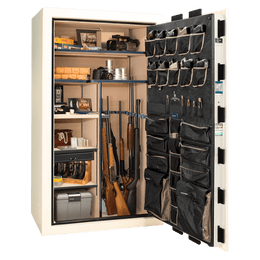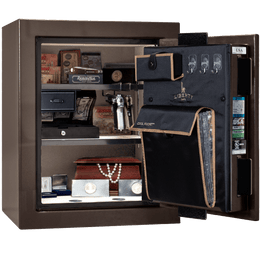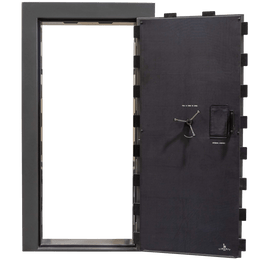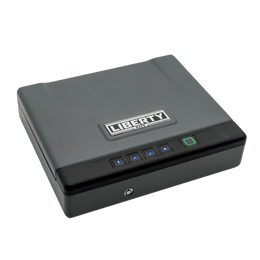Most people buy a safe to store things like firearms, jewelry, and important documents. But when disaster strikes, your safe can serve an even greater purpose. In an emergency—whether it’s a fire, natural disaster, or extended power outage—having a well-thought-out emergency kit stored in your safe can make all the difference.
In this guide, we’ll walk through how to build an emergency kit tailored to your safe, and why it should include more than just valuables. We'll also share tips for maximizing space and choosing safe-friendly storage containers. Whether you own a Liberty Safe for home protection or gun security, this post will help you turn it into a smarter survival tool.
Why Store an Emergency Kit in Your Safe?
Safes are engineered to protect against threats like fire, theft, and water damage—which makes them a smart place to keep items you may need to access during or after a crisis. Think beyond valuables: your safe is one of the most secure, fire-resistant locations in your home. That means it’s also a great place to store:
- Emergency cash
- Backup power sources
- Medications Identity documents
- Digital backups
- Emergency contact information
Having these essentials in one protected location ensures you're prepared even if other parts of your home are compromised.

Core Categories to Include in Your Safe-Based Emergency Kit
Let’s break down what to include by category.
1. Identification & Documents
Make photocopies or secure digital versions (stored on an encrypted USB drive or SD card) of:
- Driver’s licenses, passports
- Social Security cards
- Birth certificates
- Insurance policies (home, auto, health, life) Deeds, titles, and legal documents
- Medical records
Pro tip: Store physical copies in waterproof pouches or laminate them—but be cautious. Some documents, like birth certificates, may lose legal validity if laminated. Always check guidelines for each type of document.
2. Emergency Cash
In many emergencies, electronic payments may be down. Storing small denominations of cash ($1s, $5s, and $10s) ensures you can pay for essentials like food or gas if credit cards or mobile payments are unavailable.
Store cash in a sealed envelope or fire-resistant pouch to keep it organized and safe. Many Liberty Safes come equipped with built-in Cool Pocket technology—a fire-resistant document pouch designed to provide an added layer of heat protection. These are perfect for storing emergency cash, passports, or sensitive documents that need extra safeguarding during high-heat events.
3. Digital Backups
Protect critical digital data by including:
- A USB drive or external hard drive with important documents, photos, and passwords
- Backup of your computer or smartphone (if storage allows)
Be sure to use encryption or password protection. For convenience, label devices clearly so you know what's stored where.
4. Medications & Medical Essentials
If you or a family member rely on regular prescriptions, store at least a 3-7 day supply of essential medications. Also consider including:
- Copies of prescriptions
- Epinephrine pens or insulin (if stable at room temp)
- Over-the-counter essentials (aspirin, antacids, etc.)
Note: Check expiration dates regularly and rotate stock as needed.
5. Communication & Contact Info
- Keep a small printed contact list that includes:
- Family members’ phone numbers
- Doctor, insurance provider, veterinarian
- Work/employer emergency contacts
- Emergency services (local police, fire, utility companies)
While phones usually store this info, it’s smart to have a hard copy in case your device is lost, damaged, or dead.
6. Flashlight & Backup Power
A small LED flashlight with long battery life can be a literal lifesaver if the power goes out. Also consider storing:
- A power bank (fully charged)
- Extra AA/AAA batteries
- A hand-crank flashlight or weather radio
Avoid large or bulky electronics, but compact and rugged models are ideal.
7. Keys & Spare Items
Store spare copies of:
- House keys
- Car keys
- Safe keys (for another safe or internal compartments)
- PO box keys
Consider including an extra cell phone (cheap prepaid model) stored fully charged and powered off.
8. Personal Safety Items
Depending on your needs and space, you might include:
- A multi-tool or small pocketknife
- A whistle for signaling
- Pepper spray (if legal and safe to store inside your model)
Always follow manufacturer instructions and your state laws when storing self-defense items.
9. Family-Specific Essentials
If you have young children, elderly family members, or pets, consider:
- Spare pacifiers, formula packets, or baby meds
- Pet ID tags, a leash, and basic vet records
- Hearing aid batteries or glasses
Think through your household and personalize accordingly.
Safe Storage Tips: Keep It Organized and Accessible
Even with limited space, you can create an organized and functional emergency kit inside your safe. Here are some storage tips:
- Use labeled pouches or stackable containers. This helps separate categories and keeps things tidy.
- Opt for soft packs over hard cases when space is tight.
- Place frequently needed items near the front or at eye level.
- Review your kit every 6–12 months to refresh expired items and update contents.
- Leave a list inside the safe (or taped inside the door) summarizing what’s inside your kit.

Safes That Work Well for Emergency Kits
While nearly any Liberty Safe can store basic emergency items, the following models are especially well-suited:
- Premium Home Safe Series: Compact, fire-rated, and perfect for families focused on document and small-item security.
- Centurion and USA Series: Room for valuables, firearms, and emergency supplies without overwhelming space.
- Presidential Series: Our most premium safe, with high capacity, upgraded fire protection, and customizable storage.
Not sure which safe works best for your household? Start with our Safe Quiz to find the right fit for your needs. For additional help, you can reach out to our customer service team here, or connect with a local Liberty Safe dealer using our Find a Dealer tool.

Peace of Mind in Every Situation
You never know when an emergency will strike—but when it does, being prepared is everything. Creating an emergency kit inside your Liberty Safe helps ensure that no matter what happens, the most critical items in your life are protected, organized, and ready when you need them most.
From vital documents to medications, flashlights to spare keys, your safe can do more than defend against theft. It can become a trusted tool for resilience.
Take the next step in home preparedness. Explore Liberty Safe's range of fire-rated safes here and start building your emergency kit today.







